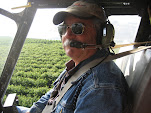The Bay Islands are pretty remote. Not just in a physical sense - although they are 40 miles distant from the nearest mainland. But as far as Honduras' capital of Tegucigalpa is concerned, the Bay Islands may not even exist. All of the money the government has is already given out before they get down to us on the list of the needy.
Guanaja, with all of 13,000 people or so, only has marginal little medical clinic. For anything more complicated than a broken fingernail, patients are routinely sent to the city of La Ceiba on the mainland where they can receive free medical attention. To get there, they must catch one of the sporadic commuter airline flights. Takes about twenty minutes, costs about $120 round-trip.
Now that we have our helicopter down here, some of the locals assume that we run a 24/7 air ambulance. I get calls at all hours of the day and night to do "urgent" transports. Takes about 45 minutes one-way. Some we do, some we don't.
First one I did was a pretty little pregnant girl with complications, needed immediate surgery. She got it in time, and mother and child are fine. Second was a guy who was on the wrong end of a machete fight. He ended up losing the hand, lots of stitches closed his other wounds.
Third and fourth were a "two-fer." The woman who had been our longtime Postmaster on Guanaja was visiting La Ceiba when she had a serious heart attack. Her family wanted to bring her back to Guanaja to die at home. Naturally they called me. This was more of a mercy flight than anything else, but what the heck. When they loaded her onboard, it was clear that if the attending nurse stopped squeezing the oxygen bag the elderly woman would die. Which is just what she did 30 minutes after I landed her in Guanaja.
Coincidentally, as I was fueling the ship in preparation for the flight, one of our employees was at the airport and limped over to our hangar, having gotten bumped off the commuter flight due to no seats. While working, he had gotten rammed in the...well, let's say "tender region" by the handle of a wheelbarrow. His 'nads had swollen to the size of a grapefruit (this was described to me, not actually witnessed). He was walking funny. It looked painful. Local doc said he needed surgery. Instead of taking the commuter, I transported him down to La Ceiba while headed there to pick up the Postmistress.
I've had to turn down a couple of flights. One night we had a bad boating accident that killed three teenage boys and injured two teenage girls. The call came in on an overcast, moonless night not long after I'd gotten home from dinner and drinks (lots of drinks) at a local restaurant. Even without the alcohol involvement, it would have been too risky. Our FH1100 is not equipped with the necessary instrumentation needed for such a flight. And I'm just not that brave/invincible anymore. It hurts to say no, but sometimes you have to. You can't save the world.
I have no doubt that we will be doing more of these medical flights. Fortunately, the FH1100 is very easy to convert from passenger to stretcher configuration, and I can do it at an enroute stop. Donating the helicopter for such public service flights is obviously a good thing for the community. But I will not deny that it makes us feel really good to do something truly useful and helpful with the machine. My boss is an incredibly generous person. I'm not sure the community really appreciates it yet, but I have a feeling they will come to in time.

1 comment:
Bob - We both know that you could add a lot more info re: the flights. We here on the island know and appreciate the work you and Bill, et al. are doing. People do not realize the remoteness of our area and probably will find a lot of what you say here impossible to believe. Believe me, it is a real challenge to live here but the people and the island ambiance make it worth while.
Post a Comment